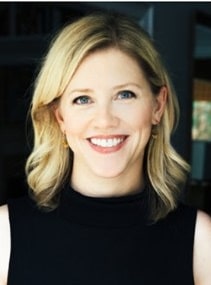NEWS
Author Mary Laura Philpott Coming to Main Street Books

Mary Laura Philpott
“I Miss You When I Blink,” the debut collection by acclaimed essayist and Davidson graduate, Mary Laura Philpott, was named a Most Anticipated Book of 2019 by BuzzFeed, The Millions, Bustle, and others. The author asks: What happens after you check off all the boxes on your to-do list and realize you might need to reinvent the list—and yourself?
Main Street Books is excited to welcome Philpott back to the place she called home for four years, particularly to celebrate the profound achievement that is “I Miss You When I Blink.” She will be the guest speaker at Main Street Books on Tuesday, April 9 at 7:00 p.m.
Philpott is the author and illustrator of a humor book called “Penguins with People Problems”; a writer whose work appears in publications including The New York Times, The Paris Review, The Washington Post, O The Oprah Magazine, and others; the founding editor of MUSING, the digital magazine published by Parnassus Books; and an Emmy-award winning co-host of “A Word on Words,” a literary interview show on Nashville Public Television.
The new book is full of spot-on observations about home, work, and creative life, Philpott takes on the conflicting pressures of modern adulthood with wit and heart. She offers up her own stories to show that identity crises don’t happen just once or only at midlife; reassures us that small, recurring personal re-inventions are both normal and necessary; and advises that if you’re going to faint, you should get low to the ground first. Most of all, Philpott shows that when you stop feeling satisfied with your life, you don’t have to burn it all down and set off on a transcontinental hike (unless you want to, of course). You can call upon your many selves to figure out who you are, who you’re not, and where you belong. Who among us isn’t trying to do that?
“I Miss You When I Blink,” features a charming, quirky, self-conscious, introspective, and hilarious narrator, who grapples with the complexities of everyday mothering, working, spouseing, neighboring, friending, and simply living
Eleanor Merrell, the Event Coordinator of Main Street Books, conducted the following interview with Philpott. It’s insightful questions result in and honest, revealing answers.
MAIN STREET BOOKS: What book or writer has had the greatest impact on you as a reader? As a writer?
MARY LAURA PHILPOTT: Because you’re book-people like me, I know you’ll understand that I’m not being coy — I’m just being honest! — when I say I truly can’t choose just one book or writer to answer this question. So, I’ll narrow down the parameters to “books or writers within your own genre, from the past year” — how about that?
Two memoirs-in-essays came out in 2018 that really knocked my socks off: “I Am, I Am, I Am” by Maggie O’Farrell and “How to Write an Autobiographical Novel” by Alexander Chee. I mean, they were so good I actually had to pause in my final edits of my own book and pep-talk myself into believing that if I kept working, I might one day produce something as amazing as either of those books.
I’ve also been a fan of the Davids — Sedaris and Rakoff — for a long time. I rarely re-read, but I do re-read them. Rakoff had such a way of blending humor into heavy material and cracking a dark joke at just the right moment. And I’ve always loved Nora Ephron’s writing, the way she captures funny little habits and bits of dialogue in such a lifelike way. I’ve done a horrible job of answering this question, haven’t I?

Eleanor Roosevelt
MSB: In your essay collection, you explore the concept of having multiple of versions of self. Some of those versions are rooted in relationships — for example, Mary Laura Philpott as daughter, wife, friend, or parent. Some are tied to time — Mary Laura Philpott as child, teenager, young adult, or approaching middle age. Some emerge from profession, hobby, or the speculative ripples that follow important decisions. You gaze into a parallel universe and envision the other paths your life could have taken and the other people you could’ve been (but, realistically, you’d probably still have Eleanor Roosevelt, right?). Is there a version of yourself that you crave most often?
MLP: So that’s the thing: no. There’s not one version of me I crave the most or wish to return to above all others. I want “and,” not “or.” I want to bounce around and be every version of myself for a little while, on rotation. This is why we need nerds to hurry up and invent a time machine. If anything — and I talk about this some in the essay called “The Window” — I find myself wanting to return to times when my loved ones were a little younger. Not because I don’t love them now… It’s not like I loved my baby-kids more than I love my teenager-kids or that I love my younger parents or younger version of my spouse more than my older parents or current version of my spouse. It’s that I get really panicky when I think about how fast time is moving, and then I get all morose about mortality. I want more time with the people I love.
I want to bounce around and be every version of myself for a little while, on rotation.
MSB: Your house is on fire and you are within. The heat is stinging your eyes. Smoke is clogging your lungs and you’re sputtering. You locate your exit and your hand flies out to grab:
(a) Leftover cake
(b) Brandi Carlile CD collection
(c) Davidson College diploma
(d) Photo of you and Mindy Kaling taken at the publishing conference party (p.s. – if you have a file of this photo that you’d be willing to share, we’d love to post it with the interview!)
(e) “Groovetaculous” (pg. 90) ‘70s party dress
MLP: You people are monsters. I think you know I’d save my dogs. Wait, I mean my kids. My husband. I’d be a hero, obviously.
Also, I like to think that by some witchy magic, my Davidson diploma would resist the flames, and we’d find it later in pristine condition among the rubble.
(I’m teasing. But this question did make me go back and look at that Mindy Kaling photo again, and I’m still just as horrified by my fangirl behavior now as I was at the time, and I’m very glad that I named an essay in this book, “I’m Sorry, Mindy Kaling.”)
MSB: There are so very many nuggets of wisdom in this book that seem to nudge up against the realm of truth, but do you ever worry that you’ll reread your writing a decade or two from now and realize that your philosophy or perspective has completely changed, and your words no longer resonate with you?
MLP: Oh, absolutely. And as I’ve talked to other writers, I’ve come to understand that’s totally normal. A book is not only a snapshot of the events and people depicted in that book, but a snapshot of the author as she wrote it. If we jumped ahead 20 years and you picked any essay and made me write about what’s in it, I’m sure 20-years-later-me would describe things differently and take different things from those experiences than the me who wrote the version that’s in the book.
A book is not only a snapshot of the events and people depicted in that book, but a snapshot of the author as she wrote it.
I’m also a compulsive editor, and I never reach a point where I feel like a piece is completely finished. So, I’ve already thought of a million tiny things I’d change. At a certain point, you just have to let it go or nobody will ever get to read it.
MSB: Between the handful of essays that were published previously and the new pieces you wrote for this collection, many of the essays in this book were written years apart; yet the book feels cohesive, almost as though you wrote each essay consecutively or to comprise a memoir. Can you speak to how the collection came to read so seamlessly?
MLP: Thank you so much for saying that. I’m glad you feel it reads cohesively! Most of the pieces in the book were written within a three-year period, but you’re right, some were written much earlier. For most of those three years, my job was just to keep writing and adding more essays to the pile.
For a while, especially early on, I thought I was writing a stack of totally unrelated material. I figured the unifying thread was humor, and that otherwise each piece was its own thing. But about halfway through the writing process, I realized I was coming back to a lot of the same questions and issues in each story I told and that there were some obvious thematic threads, too. Isn’t it funny how sometimes you don’t know what you’re writing until you’ve written it?
Isn’t it funny how sometimes you don’t know what you’re writing until you’ve written it?
It was toward the end of the process that I let myself turn my attention to how the essays fit together as a collection. Figuring out what order they’d go in was really hard. In the end, I had to print them and lay them out on the floor — in some cases, cutting essays into pieces with scissors — to arrange them into an arc that made sense. And then I spent the remainder of the process editing them to flow together, removing redundancies, etc.
MSB: Most of your essays conclude artfully and upliftingly with insight gained (don’t move to Ireland expecting a change of place to grant a change of personhood, don’t accost Mindy Kaling, do make intentional choices about how you live, etc.). However, there’s one essay that breaks tone, when you become less Nora Ephron, more David Rakoff. The essay closes with the following passage:
“We act like there are safe places. We behave as though if we work hard and acquire the right things, gain the right access, put ourselves in the right zones, we can arrive somewhere where danger can’t touch us – where anything can’t happen. We pretend that if we can identify someone else’s loss as greater than ours, we don’t lose. But nothing really guards our lives. Lifeguards don’t exist.” (pg. 171)
This is not the only essay where you grapple with mortality and existential anxiety. It is, however, the one where your narration changes most noticeably. Why did it feel important to alter your voice here?
MLP: Wow — what a great question, and what a close read. I hadn’t really thought of it before, but you’re right — there’s a definite tonal shift there. And if you’re following the memoir-ish arc of the stories I’m telling from essay to essay, that spot in the book marks a turn. The next few essays that follow it delve into feelings of depression, frustration, and panic. So, I suppose that essay is a signpost of sorts: dark material lies ahead, proceed with caution.
MSB: Your Main Street Books reading falls on Free Cone Day. What’s your go-to Ben & Jerry’s flavor?
MLP: Phish Food all the way.


